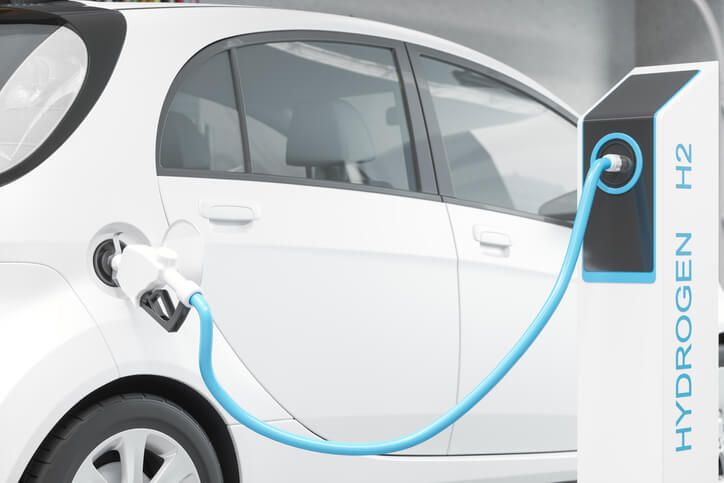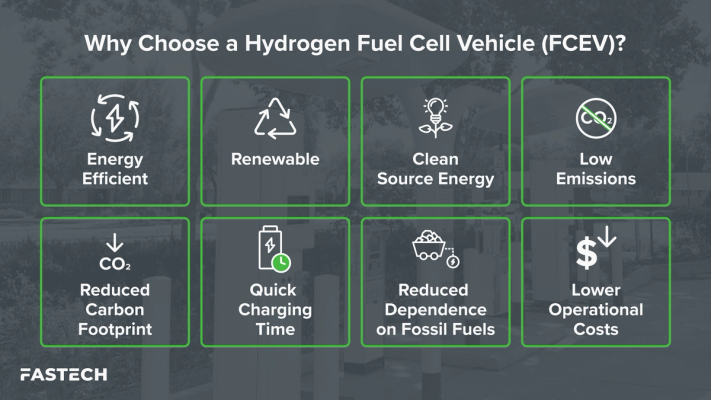8 Reasons Why Hydrogen Fuel Cell Vehicles Just Make Sense

Hydrogen is one of the most popular renewable energy sources today, thanks to producing electrical power without releasing greenhouse gases. With its wide variety of applications, from manufacturing to transportation, the benefits of fuel cell technologies are almost limitless.
Fuel-cell vehicles (FCVs) combine hydrogen and oxygen to create electricity that powers the motor. However, unlike traditional internal combustion engines, hydrogen fuel cells do not produce carbon dioxide or other greenhouse gas emissions, only water and heat.
Today we’ll go over eight advantages of hydrogen fuel cell vehicles and why they might meet your business’s energy needs.
Read 3 Trends Fueling the Hydrogen Movement in 2021

1. Energy Efficient
Hydrogen has the highest energy content by weight of any standard fuel. In addition, because of its high density, hydrogen provides excellent energy efficiency. Most internal combustion engines operate around 25 percent efficiency; however, a stationary fuel cell, in a combined heat and power system, can reach efficiency levels over 80 percent.
2. Renewable
As one of the most abundant elements in the universe, hydrogen is a uniquely renewable source of energy that can easily support our future zero-carbon needs in all kinds of fueling applications.
Hydrogen can also be easily produced domestically in the United States from waste, biomass, wind, solar, tidal, wave, or geothermal extraction. With so many options for hydrogen generation, the U.S. can carve the path toward a sustainable future while reducing our dependence on foreign oil and other fossil fuels.
3. Clean Energy Source
Hydrogen fuel cells are a clean energy source with virtually no adverse environmental impact. For example, when hydrogen is used to power an internal combustion engine, it burns “clean,” producing only heat and water, in addition to electricity. As just one of the many advantages of hydrogen fuel cells, this shows that hydrogen fuel cells are nontoxic, accessible, and renewable.
The increased adoption of hydrogen as a renewable energy source also directly supports many zero-carbon energy initiatives. For example, NASA plans to use the water produced as a byproduct of hydrogen fuel as drinking water for space crews.
4. Low Emissions
In addition to not releasing greenhouse gases and other undesirable emissions into the atmosphere, hydrogen fuel cells also minimize other kinds of pollution. For example, one of the benefits of fuel cells is that they also do not produce noise pollution, unlike wind power and other renewable energy sources.
Hydrogen fuel cell vehicles are much quieter than cars with conventional internal combustion engines. If hydrogen fuel cell vehicles become widespread, the reduction in noise pollution would have a noticeable impact, particularly in highly populated urban areas with lots of traffic.
5. Reduced Carbon Footprint
Depending on how they’re produced, hydrogen fuel cells have virtually zero carbon emissions, meaning they do not release any harmful greenhouse gases. This almost eliminates their carbon footprint while in use.
6. Quick Charging Time
Compared to conventional internal combustion engine vehicles and even battery-powered electric vehicles, the charging time for hydrogen fuel cells is incredibly fast.
One of the significant downsides of electric vehicles is the time it takes to recharge, ranging from 30 minutes to several hours. In contrast, hydrogen fuel cells can be recharged in under five minutes. This provides the same flexibility as a car fueled by gasoline or diesel, making hydrogen fuel cell vehicles more accessible and easy to use.
7. Reduced Dependence on Fossil Fuels
Because hydrogen can be produced or extracted in many ways, hydrogen fuel cells can reduce the dependency of a nation on fossil fuels to democratize energy around the world.
Energy independence can help countries avoid the problem of soaring fossil fuel prices, enabling them to invest their resources in other areas of their infrastructure.
8. Lower Operational Costs
Hydrogen fuel cells can also reduce operational costs compared to electric car batteries and internal combustion engines. They eliminate the need to charge, change, and manage batteries, which leads to reduced labor, time, space, and peak power demands. Faster charging times also substantially reduce vehicle and personnel downtime, which adds up.
Maintaining hydrogen fuel cells doesn’t require many site visits, reducing operational costs by as much as 84 percent compared to combustion generators for stationary power.
Prepare for the Future of Hydrogen Cell Vehicles With FASTECH
The future of hydrogen as a go-to renewable source of energy is on the horizon.
With the global hydrogen fuel cells market projected to reach $13.7 billion by 2026, expanding our hydrogen infrastructure is more critical than ever. To date, FASTECH has built over 30 hydrogen stations for leading corporations and energy providers, such as Toyota and Air Products Inc.
To learn more about how FASTECH can help with your hydrogen fueling project, contact us today.




